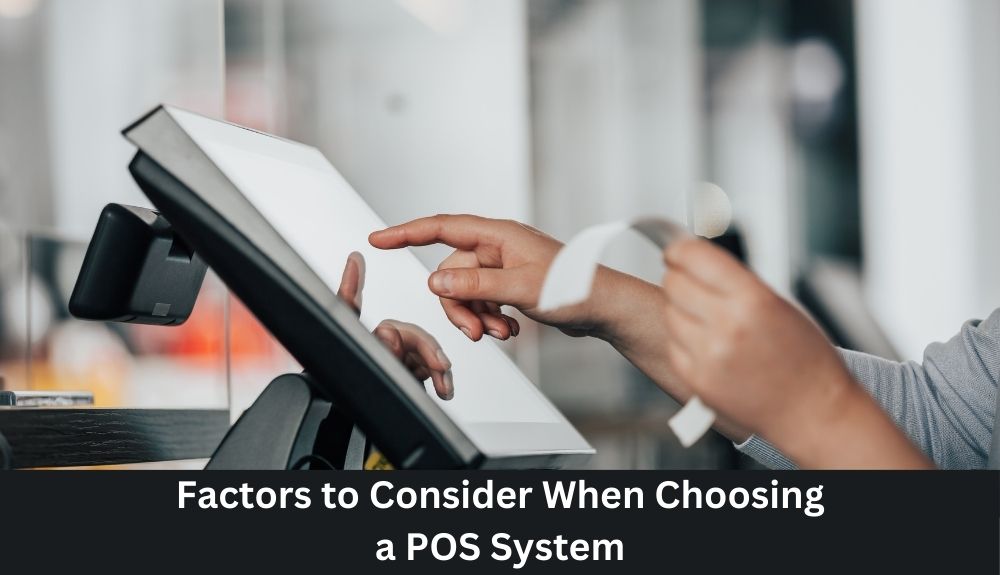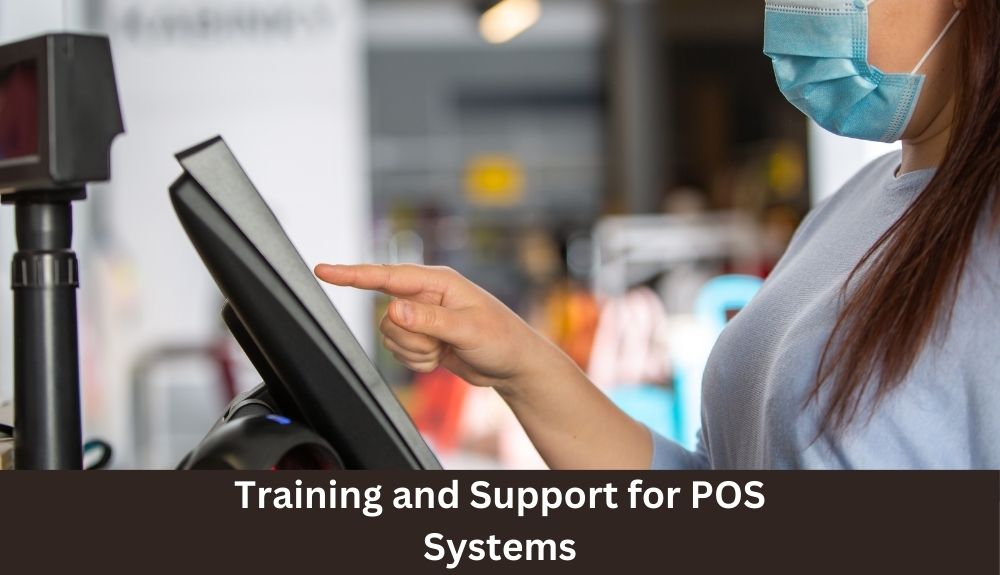
By max February 7, 2024
Introduction to Point of Sale Systems
Welcome to the world of modern business, where efficiency and customer experience reign supreme. In this fast-paced era, it’s crucial for businesses to stay ahead of the game by adopting the right tools and strategies. And when it comes to streamlining operations and delighting customers, choosing the right point of sale (POS) system can make all the difference.
Gone are the days of clunky cash registers and manual processes. Today’s POS systems offer a wide range of features designed to enhance efficiency, improve accuracy, and create unforgettable experiences for your valued customers. But with so many options available in the market, how do you choose the perfect fit for your business?
Fear not! In this blog post, we will delve into why selecting a suitable POS system is crucial for your business success. We’ll explore its benefits, discuss key factors to consider during selection, highlight different types of POS systems available today, examine must-have features in a good system, analyze how it enhances efficiency and customer experience while providing training and support considerations along with cost analysis.
So sit back, relax (!), and get ready to discover why finding that perfect POS partner is essential for taking your business operations to new heights!
Benefits of a Good Point of Sale System
A good point of sale (POS) system can bring numerous benefits to your business. It streamlines the checkout process, allowing for faster and more efficient transactions. This means shorter wait times for customers and increased satisfaction levels.
Additionally, a reliable POS system provides accurate inventory management. It keeps track of stock levels in real-time, preventing overstocking or running out of essential items. With this information readily available, you can make informed decisions about purchasing and restocking, reducing costs and minimizing wastage.
Furthermore, a good POS system offers detailed reporting capabilities. You can access data on sales trends, popular products, customer preferences, and more. These insights enable you to make data-driven decisions about marketing strategies and product offerings.
Another advantage is that a POS system integrates with other business tools such as accounting software or customer relationship management systems. This seamless integration saves time by automating tasks like syncing sales data or generating financial reports.
Lastly but not least important is the enhanced security provided by a good POS system. Modern systems offer encryption technologies to protect sensitive customer payment information from potential breaches.
In conclusion, investing in a good POS system brings significant benefits to your business – improved efficiency at the checkout counter; better inventory management; access to valuable sales data; seamless integration with other tools; and enhanced security measures – all contributing towards an exceptional customer experience!
Factors to Consider When Choosing a Point of Sale System

When it comes to choosing the right point of sale (POS) system for your business, there are several factors that you need to consider. One of the most important factors is compatibility with your business operations. Every business has different needs and requirements, so it’s essential to choose a POS system that aligns with your specific industry and processes.
Another factor to consider is scalability. As your business grows, you want a POS system that can grow with you. Look for a system that offers flexibility in terms of adding new features or integrating with other software solutions as needed.
Reliability is also crucial when selecting a POS system. You want a solution that will be up and running at all times without any glitches or downtime. It should be able to handle high transaction volumes efficiently without slowing down or crashing.
Security is another critical aspect to consider. With the rise in cyber threats, it’s vital to choose a POS system that prioritizes data security and encryption protocols. This will help protect both your customers’ information and your own sensitive data.
Ease of use is also an essential factor when deciding on a POS system. Your employees need to quickly learn how to navigate through the interface and complete transactions efficiently. Look for intuitive systems with user-friendly interfaces, as this will save time during training sessions.
Cost must be factored into the decision-making process. While price shouldn’t be the sole determining factor, it’s important not to exceed your budget limits either. Consider both upfront costs and ongoing fees associated with maintenance or updates before making your final decision.
By carefully considering these factors when choosing a POS system for your business, you can ensure enhanced efficiency in daily operations while providing an improved customer experience at every touchpoint!
Types of Point of Sale System Available
When it comes to choosing a point of sale (POS) system for your business, you’ll quickly realize that there are several types available in the market. Each type has its own unique features and functionalities, catering to different industries and business needs.
One popular type of POS system is the cloud-based POS system. This type of system allows you to access your sales data from anywhere with an internet connection. It offers real-time reporting and analytics, inventory management capabilities, and seamless integration with other software applications.
Another option is the mobile POS system, which utilizes smartphones or tablets as the main hardware component. This type of system is ideal for businesses that require flexibility and mobility, such as food trucks or pop-up shops. With a mobile POS system, you can process transactions on-the-go and provide a more personalized customer experience.
For businesses with multiple locations or franchises, a multi-store POS system may be the best choice. This type of system allows you to manage all your stores from one central dashboard, making it easier to track sales performance across different locations and streamline operations.
If your business operates in an industry that requires specialized functionality, such as restaurants or bars, then a restaurant-specific POS system would be most suitable. These systems offer features like table management, kitchen display systems (KDS), menu customization options, and even online ordering capabilities.
There are traditional countertop POS systems which consist of a computer terminal connected to various peripherals like cash registers and barcode scanners. Although they may lack some advanced features found in other types of systems mentioned above they still remain reliable choices for many small businesses.
Remember when choosing a POS System for your business; consider factors such as industry requirements,costs,and scalability before making a decision.
Features to Look for in a Point of Sale System
When choosing a point of sale (POS) system for your business, it’s important to consider the features that will best meet your needs. A good POS system should be user-friendly and intuitive, allowing you and your staff to quickly learn how to use it. Look for a system with a clean and simple interface that is easy to navigate.
Another important feature to look for is inventory management capabilities. A good POS system should have robust inventory tracking and management tools, allowing you to easily keep track of stock levels, set up automatic reorder points, and generate reports on sales trends.
Integration with other business systems is also key. Look for a POS system that can seamlessly integrate with your accounting software, customer relationship management (CRM) platform, and any other third-party applications you use in your business. This will streamline processes and eliminate the need for manual data entry.
Security is another critical feature to consider when choosing a POS system. Look for one that offers encryption technology to protect sensitive customer information during transactions. Additionally, choose a vendor who provides regular security updates and has measures in place to prevent data breaches.
Don’t forget about reporting and analytics capabilities. A good POS system should provide detailed reports on sales performance, customer behavior patterns, popular products or services sold at certain times of the day or year – enabling you to make informed decisions about pricing strategies or marketing campaigns.
By considering these important features when selecting a POS system for your business,you can ensure that you are making an investment that will enhance efficiency and improve the overall customer experience!
How a Good Point of Sale System Enhances Efficiency and Customer Experience
A good Point of Sale (POS) system can greatly enhance efficiency and improve the overall customer experience. With advanced features and streamlined processes, a well-chosen POS system can revolutionize the way businesses operate.
A good POS system allows for faster checkouts and reduces waiting times. It enables businesses to process transactions quickly and efficiently, minimizing queues at the checkout counter. This not only improves customer satisfaction but also increases sales as customers are more likely to make purchases if they don’t have to wait in long lines.
A reliable POS system simplifies inventory management. It provides real-time updates on stock levels, allowing businesses to track their inventory accurately. This ensures that popular items are always in stock while avoiding overstocking or shortages. Such efficient inventory management helps reduce costs related to excess inventory or lost sales due to out-of-stock situations.
Additionally, a good POS system offers comprehensive reporting capabilities. Business owners can access detailed reports on sales trends, top-selling products, customer preferences, and more. These insights enable data-driven decision-making which leads to improved business strategies and targeted marketing efforts.
Moreover, an effective POS system integrates seamlessly with other software applications such as accounting software or CRM systems. This integration eliminates manual data entry tasks and reduces errors associated with transferring information between different systems.
Furthermore, modern POS systems often come equipped with loyalty programs that allow businesses to reward loyal customers through point accumulation or exclusive discounts. This not only encourages repeat purchases but also fosters customer loyalty by providing personalized offers based on individual purchasing habits.
Training and Support for Point of Sale System

Training and support play a crucial role in ensuring the successful implementation and smooth operation of a point of sale (POS) system. When choosing a POS system for your business, it is important to consider the level of training and support provided by the vendor.
A good POS system should offer comprehensive training sessions for both management and staff. This includes not only initial onboarding but also ongoing training to keep everyone up to date with any upgrades or new features. The training should be tailored to suit the specific needs of your business, taking into account factors such as industry type, size, and complexity.
In addition to training, reliable technical support is essential for resolving any issues that may arise during day-to-day operations. Look for a vendor that offers prompt and responsive customer support through various channels such as phone, email, or live chat. It is also beneficial if they provide online resources like FAQs or video tutorials that can help troubleshoot common problems.
Furthermore, consider whether the vendor provides regular software updates and maintenance services. These updates not only improve system functionality but also address potential security vulnerabilities.
Choosing a POS system with robust training and support ensures that you have access to expert guidance whenever needed. This reduces downtime due to technical issues or user errors while maximizing productivity.
Remember, investing in proper training and ongoing support will ultimately enhance efficiency in using your POS system while providing an improved experience for both you as the business owner/operator and your customers alike!
Cost Analysis: Investing in a Point of Sale System vs Manual Systems
The decision to invest in a point of sale system for your business is not one to be taken lightly. It requires careful consideration of the benefits, factors, types, and features of different POS systems. However, one aspect that cannot be ignored is cost analysis: comparing the investment in a POS system with manual systems.
When it comes to manual systems, the costs can quickly add up. From purchasing cash registers and receipt printers to hiring additional staff for data entry and inventory management, there are numerous expenses involved. Not to mention the potential for human error and inefficiency that can arise from relying on manual processes.
On the other hand, investing in a modern POS system offers long-term savings and efficiency gains. While there will be an upfront cost associated with purchasing hardware and software licenses, these expenses are often outweighed by the benefits provided by these systems.
A good POS system streamlines operations by automating tasks such as inventory management, sales tracking, employee scheduling, and customer relationship management. This automation reduces errors and saves time which directly translates into increased productivity and lower labor costs.
Additionally, a well-designed POS system provides valuable insights through detailed analytics reports. These reports help you make informed business decisions based on real-time data about sales trends, peak hours or seasons when you need extra staffing or promotions to boost revenue.
Furthermore, a good POS system enhances customer experience by allowing seamless transactions through various payment options like credit cards or mobile payments while also providing loyalty programs or discounts effortlessly at checkout without any delays or confusion for customers.
